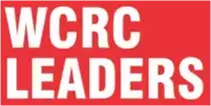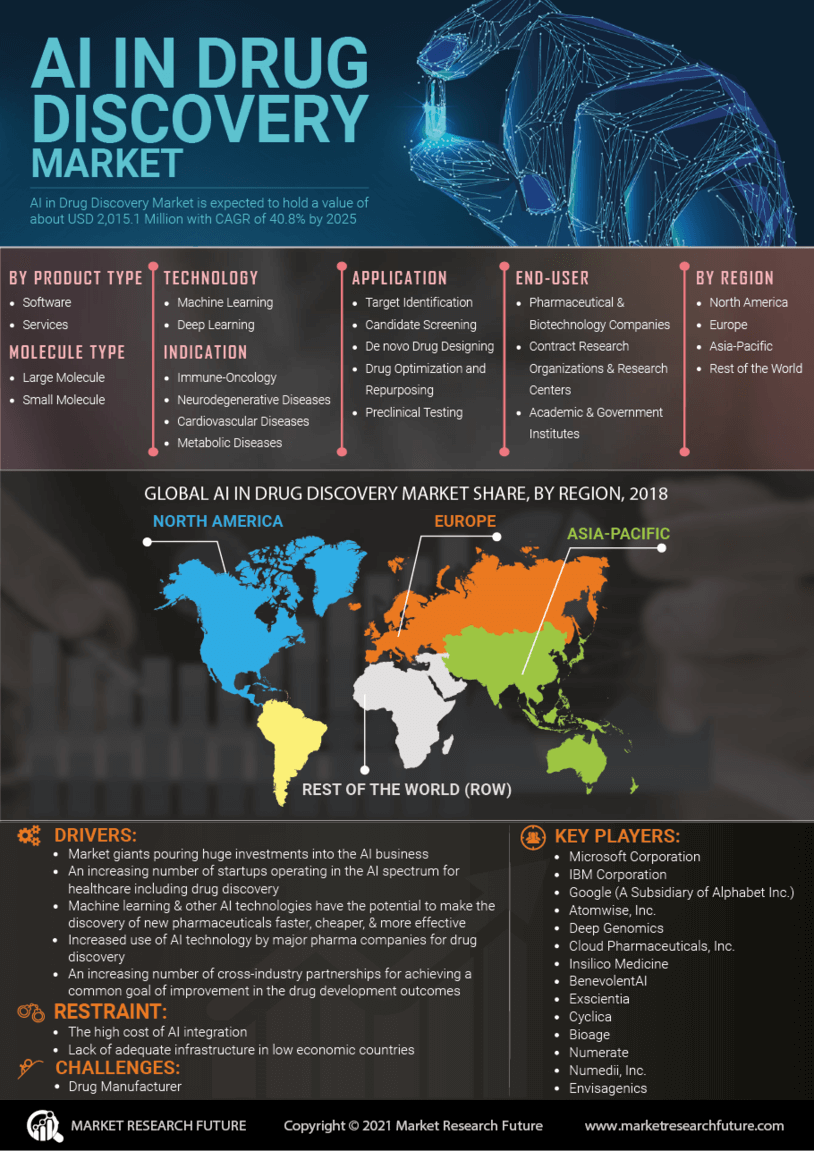Global Artificial Intelligence in Drug Discovery Market Overview
The Artificial Intelligence in Drug Discovery Market size was valued at USD 0.56 billion in 2022 and is projected to grow from USD 0.72 Billion in 2023 to USD 5.94 billion by 2032, exhibiting a compound annual growth rate (CAGR) of 29.83% during the forecast period (2024 - 2032). The increasing adoption of AI in drug discovery, rising strategic initiatives for AI in drug discovery, and the increasing number of AI-powered drug discovery start-ups are driving market growth.
The incorporation of AI and machine learning tools in drug discovery and development applications could enhance healthcare outcomes by increasing the efficiency of the drug discovery process, facilitating the identification of targeted molecules, lowering the risk of adverse reactions during trials, speeding up the drug discovery process, and most importantly, decreasing the cost of drug development for the drug manufacturer.
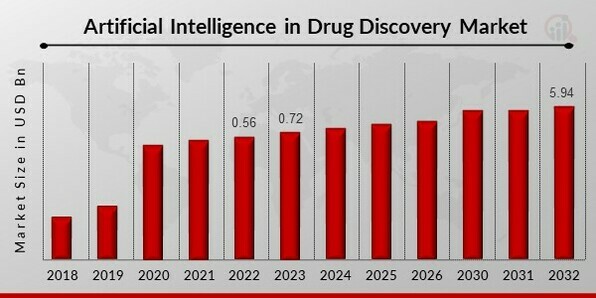
Source: Secondary Research, Primary Research, MRFR Database and Analyst Review
The market is growing as a result of expanding strategic efforts for AI in drug development, rising acceptance of AI in drug discovery, and an increase in the number of start-ups using AI to power drug discovery. Target identification, lead optimization, toxicity prediction, and clinical trial design are just a few of the activities that AI is utilized for in drug discovery. The pharmaceutical sector makes significant investments in AI-based drug development, and many large companies collaborate with or buy AI start-ups.
By improving the effectiveness of the drug discovery process, facilitating the identification of targeted molecules, lowering the risk of adverse reactions during trials, speeding up the drug discovery process, and most importantly, lowering the cost of drug development for the drug manufacturer, the incorporation of AI and machine learning tools in drug discovery and development applications may improve healthcare outcomes.
Modern technology have been used by the pharmaceutical business for a long time to assist provide dependable, secure medicines to consumers. Additionally, both the pharmaceutical business and the consumer healthcare sector have benefited greatly from the application of AI and machine learning. 60% of respondents said that this gives the pharmaceutical and healthcare sectors more control over quality.
August 2023: Partex and Parexel, two clinical research organizations, have established a partnership to use AI-driven solutions to de-risk the assets in their portfolios and speed medication discovery and development for biopharmaceutical clients globally. The big data and AI capabilities of Partex's data-to-drugs platform combined with Parexel's global expertise in Phase I to IV clinical development are anticipated to advance the efforts of drug developers seeking to understand the likelihood of clinical success of the assets in their portfolio and suggest additional disease indications for which their assets may be clinically viable. Anticipating the exploratory medicines that will be available as safe and efficient therapeutic choices is one of the largest and most difficult difficulties in drug development.
Artificial Intelligence in Drug Discovery Market Trends
- The increasing adoption of AI in drug discovery to boost the market growth
The adoption of AI in drug discovery is rising among industries, including pharmaceutical and biotechnology companies. This is primarily owing to the fact that AI offers advanced advantages to discovering the drug molecule and speeds up the drug discovery process. Further, AI provides important insights to improve the designing, optimizing, and synthesizing of drugs. There are several factors that are increasing the adoption of AI for drug discovery. Some of the most predominant ones include the rising incidences of chronic diseases and precision medicine, owing to the emerging approach to the prevention and treatment of diseases.
Furthermore, several market participants are increasing the precision of their drug portfolios, a process that has been seen to showcase an increase in the adoption of AI technologies. Hence, the increasing prevalence of chronic diseases, the emerging precision medicine approach based on AI technologies, and market players applying for precision medicine with the help of AI are increasing the adoption of AI for drug discovery.
The pharmaceutical industry has long relied on modern technologies to help deliver reliable, safe pharmaceuticals to the market. In addition, the use of AI and machine learning have considerably benefitted both the pharmaceutical industry and the consumer healthcare sector. In the pharmaceutical and healthcare industries, 60% of respondents indicated that this increases control over quality. However, monitoring and diagnosis are regarded by 42% of respondents as another crucial application for AI as shown in the fig 1. Furthermore, AI technology aids in disease identification and its algorithms can pick the most effective treatments. Additionally, in the near future, the pharmaceutical sector may be able to apply AI to provide patients with personalized estimates of their preventive risk.
Figure 1: AI use cases in the pharma and healthcare industry as of 2020

Source: Secondary Research, Primary Research, MRFR Database, and Analyst Review
Artificial Intelligence in Drug Discovery Market Segment Insights
Artificial Intelligence in Drug Discovery Product and Service Insights
The Market segments of Artificial Intelligence in Drug Discovery, based on product and service, includes software and services. The services segment held the majority share in 2022 in the Artificial Intelligence in Drug Discovery Market revenue. This is due to the rising demand for AI services among end users and the increasing adoption of AI services in drug discovery. Moreover, Artificial Intelligence as a Service (AIaaS) refers to pre-built machine learning (ML) and deep learning (DL) algorithms and ready-to-use AI services and products with minimal customizability. Additionally, a few examples of typical AIaaS use cases include chatbots, virtual assistants, and ML and AI frameworks that assist researchers to answer queries and aid in the discovery of novel drugs.
November 2021: Alphabet Inc. (US) has launched a new company Isomorphic Laboratories (UK), that aims to use artificial intelligence for drug discovery. The company will leverage that success to build tools that can help identify new pharmaceuticals
Artificial Intelligence in Drug Discovery Molecule Type Insights
The Artificial Intelligence in Drug Discovery Market segmentation is based on a molecule type that includes, large molecule and small molecule. The large molecule segment has dominated the market in 2022 and the small molecule is projected to be the faster-growing segment during the forecast period, 2023-2032. This is attributed to the growing demand for life-saving drugs, and biologics, and the increased usage of AI technology in analyzing complex molecular structures. In addition, the large molecules in biopharmaceuticals, also known as biologics, are often thousands of times larger than those in their chemically produced equivalents. They are complex medicines. Frequently, there are complex biotechnological processes, such as recombinant DNA technology, used to produce proteins or peptides from biological sources. For instance, Victoza, Rebif, Levemir, Humalog, Lantus, Enbrel, NovoLog, and Epogen are a few of the crucial therapeutic proteins usually used as biological medicines. As a result, large molecules are less harmful than traditional chemotherapy.
Figure 2: ARTIFICIAL INTELLIGENCE IN DRUG DISCOVERY MARKET SIZE, BY MOLECULE TYPE, 2023 & 2032 (USD Billion)
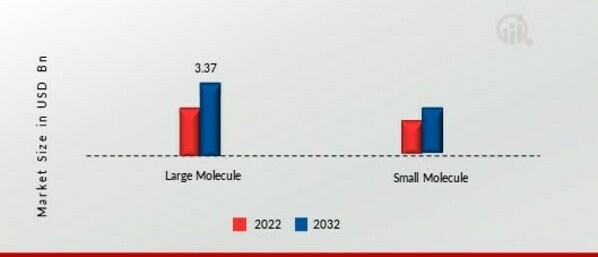
Source: Secondary Research, Primary Research, MRFR Database, and Analyst Review
Artificial Intelligence in Drug Discovery Technology Insights
The Market segmentation of Artificial Intelligence in Drug Discovery is based on a technology that includes machine learning, deep learning, and others. The deep learning segment has dominated the market in 2022 and machine learning is projected to be the faster-growing segment during the forecast period, 2023-2032. This is due to the enhanced support in product development and improvement, process optimization and functional workflows, and sales optimization, among others, which have been driving enterprises across industries to invest in deep learning applications. Furthermore, Deep learning is necessary for data science, which also includes statistics and predictive modeling. Deep learning techniques also have useful uses in microbiology, such as the analysis of metagenomic data, the development of drugs connected to microbes, the correlation of microbes with diseases, and more.
Artificial Intelligence in Drug Discovery Indication Insights
The Market segments of Artificial Intelligence in Drug Discovery is based on an indication that includes immuno-oncology, neurodegenerative diseases, cardiovascular diseases, metabolic diseases, and others. The immuno-oncology segment has dominated the market in 2022 and neurodegenerative diseases is projected to be the faster-growing segment during the forecast period, 2023-2032. This is due to the increasing incidences of cancer worldwide. Moreover, Cancer is a devastating disease, especially in developed regions, and there are four standard cancer treatments: surgery, radiation therapy, chemotherapy, and immunotherapy. In addition, AI is being employed in the field of oncologic radiographic imaging for detection and diagnosis. Thus, AI-based models are now often utilized therapeutically in many practices and are routinely incorporated into breast imaging.
August 2022: Atomwise Inc (US) signed a strategic multi-target research collaboration with Sanofi (France) for ai-powered drug discovery to leverage its AtomNet platform for computational discovery and research of up to five drug targets.
Artificial Intelligence in Drug Discovery Application Insights
The Artificial Intelligence in Drug Discovery Market segmentation is based on an application that includes target identification, candidate screening, de novo drug designing, drug optimization and repurposing, and preclinical testing. The preclinical testing segment has dominated the market in 2022 and target identification is projected to be the faster-growing segment during the forecast period, 2023-2032. This is due to the preclinical study procedures can be greatly accelerated and improved by applying AI models. These models can also standardize analysis, discover difficult-to-find objects, and provide critical visual feedback that aids in evaluating present and future outcomes.
September 2023: In order to find novel drug targets for rare neurodegenerative and neuromuscular diseases, Verge Genomics, a clinical-stage biotechnology company that transforms drug discovery using artificial intelligence (AI) and patient tissue data, today announced a multi-target collaboration with Alexion, AstraZeneca Rare Disease. The four-year contract stipulates that Verge will earn up to $42 million in compensation, which will be made up of an upfront fee, stock, and near-term payments. The deal's potential worth is $840 million, plus possible downstream royalties. Alexion sees promise in assisting researchers more effectively identify and evaluate therapeutic targets for rare diseases by utilizing Verge's AI-enabled platform in conjunction with data from patient tissue samples.
Artificial Intelligence in Drug Discovery Regional Insights
By Region, the study segments the market into North America, Europe, Asia-Pacific, and the Rest of the World. The North America artificial intelligence in drug discovery market accounted for the largest market share in 2022. This is due to the increasing incidences of chronic diseases, a large number of leading startups, and increasing pharmaceutical R&D investments in the region. According to the Centers for Disease Control and Prevention, deaths due to heart disease occurred in the US for one out of every five people in 2020. Furthermore, there are a large number of AI tool providers and leading start-ups in the region that are forming strategic alliances driving innovations and market growth.
Further, the major countries studied are the U.S., Canada, Germany, France, the UK, Italy, Spain, China, Japan, India, Australia, South Korea, and Brazil.
Figure 3: ARTIFICIAL INTELLIGENCE IN DRUG DISCOVERY MARKET SIZE, BY REGION 2023 & 2032 (USD Billion)
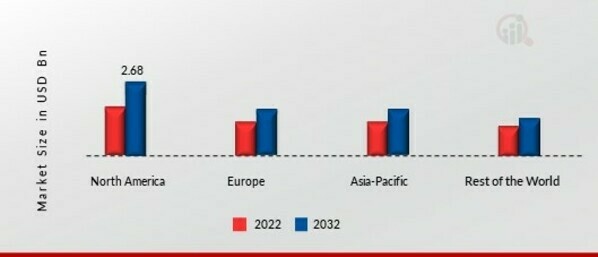
Source: Secondary Research, Primary Research, MRFR Database, and Analyst Review
Europe artificial intelligence in drug discovery market accounts for the second-largest market share due to the rising prevalence of rare diseases across Europe and increasing the demand for an AI-driven platform for drug discovery. further, Germany market of artificial intelligence in drug discovery was attributed to hold the largest market share, and the UK market of artificial intelligence in drug discovery is expected to fastest-growing market in the European region.
The Asia-Pacific artificial intelligence in drug discovery market is expected to grow at a significant share from 2024 - 2032. This is due to the rising burden of disease and the huge number of biopharmaceutical industries that are adopting AI capabilities in the Asia-Pacific region. Moreover, China market of artificial intelligence in drug discovery is expected to hold the largest market share, and India market of artificial intelligence in drug discovery is expected fastest-growing market in the Asia-Pacific region.
Furthermore, China is the home of ID, and more Chinese biotechnology companies are partnering with AI-driven companies, which further fuels the growth of the market. Furthermore, the increasing geriatric population, changes in lifestyle, increasing incidences of non-communicable diseases, and strategic initiatives, these factors are likely to have considerable growth for Artificial intelligence in drug discovery market.
The Rest of the World is segmented into the Middle East, Africa, and Latin America. Artificial intelligence in the drug discovery market in the above-mentioned regions is likely to witness growth due to increasing demand for pharmaceuticals due to the rising incidences of chronic and infectious diseases. Moreover, the increasing prevalence of communicable and non-communicable diseases, along with rising investments to make AI platforms available for drug discovery further fuel regional market growth.
Artificial Intelligence in Drug Discovery Key Market Players & Competitive Insights
The Artificial Intelligence in Drug Discovery Market is characterized by the presence of many global, regional, and local vendors catering to the demand created by research scientists and pharmaceutical and biotechnology companies operating in the industry. The market comprises tier-1, tier-2, and local players. The tier-1 and tier-2 players have reach across the globe with diverse product portfolios. Companies such as IBM (US), Alphabet Inc (US), Atomwise Inc (US), and Cloud Pharmaceuticals, Inc (US) dominate the global artificial intelligence in the drug discovery market due to product differentiation, financial stability, strategic developments, and diversified regional presence. The players are focused on investing in research and development. Furthermore, they adopt strategic growth initiatives, such as expansion, product launches, joint ventures, and partnerships, to strengthen their market position and capture a large customer base.
One of the primary business strategies adopted by manufacturers in the global artificial intelligence in the drug discovery industry to benefit clients and expand the artificial intelligence in the drug discovery market sector is to manufacture locally to reduce operating costs.
International Business Machines Corporation (IBM) is an IT technology and consulting firm providing computer hardware, software, infrastructure, and hosting services. The firm provides a variety of services, such as cloud, networking, security, technology consulting, application services, business resiliency services, and tech support services. It provides services to a variety of sectors, including those in the automotive, banking, and financial markets, electronics, energy, utilities, healthcare insurance, life sciences, manufacturing, metals, and mining, retail, and consumer products industries. Furthermore, the company has operations in the Americas, Europe, the Middle East, Africa, and Asia-Pacific.
Also, Alphabet Inc. provides a range of products and platforms across the globe. It operates using google services, google cloud, and others. The google services division offers ads, android, chrome, hardware, gmail, google drive, google maps, google photos, google play, search, and youtube. Along with selling apps, in-app purchases, and digital content through the google play store, fitbit wearables, google nest products, pixel phones, and other devices, it also offers youtube non-advertising services. Additionally, the google cloud division provides infrastructure, platform, and other services, as well as other services for business clients. Google Workspace includes cloud-based collaboration tools for businesses like Gmail, docs, drive, calendar, and meet. The company has operations in the Americas, Europe, Asia-Pacific, the Middle East, and Africa.
Key Companies in the Artificial Intelligence in Drug Discovery Market include
- IBM (US)
- Alphabet Inc (US)
- Atomwise Inc (US)
- Deep Genomics (Canada)
- Cloud Pharmaceuticals, Inc (US)
- Microsoft corporation (US)
- Insilico Medicine (China)
- Cyclica (Canada)
- BenevolentAI (UK)
- Exscientia (UK)
Artificial Intelligence in Drug Discovery Industry Developments
December 2022: IBM (US) acquired AlchemyAPI (US) a startup to bring deep learning to Watson. The goal is to use AlchemyAPI's resources to boost the "cognitive" computer system IBM Watson's intelligence.
April 2020: IBM (US) launched the cloud and AI-powered COVID-19 High-Performance Computing Consortium service to help the health and research community accelerate the discovery of medical insights and treatments for COVID-19.
September 2019: Atomwise Inc. (US) collaborated with Hansoh Pharma (China) to design and discover potential drug candidates for up to eleven undisclosed target proteins in multiple therapeutic areas.
May 2023 :
Numerous businesses are using AI to aid in the development of medications, which may cost billions of dollars and often fail during the trial stage. With two new suites designed to handle drug discovery while boosting precision medicine, Google's Cloud division is the most recent to enter that contest. Drug companies hope to gain a better understanding of proteins and amino acids by using the Target and Lead Identification Suite. It is specifically made to assist researchers in locating biological targets for the creation of medicines. This might reduce expenses and expedite the development of new drugs.
May 2023:
VeriSIM Life has created "digital twins" of different animal species and human body types, using artificial intelligence to evaluate how drugs will affect real-life patients before they even enter clinical trials. After that, a translational index score—which Varshney compares to a credit score—is given to the medicine. Drug manufacturers might need to adjust the focus of their experimental design or start again if a score is poor. However, starting anew with a new drug that works can be generated fast utilizing AI simulations as opposed to actual animal trials, thanks to the software platform's ability to test millions of hypotheses, as opposed to the conventional process of trial and error that typically takes years.
Artificial Intelligence in Drug Discovery Market Segmentation
Artificial Intelligence in Drug Discovery Product and Service Outlook
Artificial Intelligence in Drug Discovery Molecule Type Outlook
- Large Molecule
-
Small Molecule
Artificial Intelligence in Drug Discovery Technology Outlook
- Machine Learning
- Deep Learning
- Others
Artificial Intelligence in Drug Discovery Indication Outlook
- Immuno-oncology
- Neurodegenerative Diseases
- Cardiovascular Diseases
- Metabolic Diseases
- Others
Artificial Intelligence in Drug Discovery Application Outlook
- Target Identification
- Candidate Screening
- De novo Drug Designing
- Drug Optimization and Repurposing
- Preclinical Testing
Artificial Intelligence in Drug Discovery Regional Outlook
-
North America
-
Europe
- Germany
- France
- UK
- Italy
- Spain
- Rest of Europe
-
Asia-Pacific
- China
- Japan
- India
- Australia
- South Korea
- Rest of Asia-Pacific
-
Rest of the World
- Middle East
- Africa
- Latin America
| Report Attribute/Metric |
Details |
| Market Size 2022 |
USD 0.56 billion |
| Market Size 2023 |
USD 0.72 billion |
| Market Size 2032 |
USD 5.94 billion |
| Compound Annual Growth Rate (CAGR) |
29.83% (2024-2032) |
| Base Year |
2023 |
| Forecast Period |
2024-2032 |
| Historical Data |
2019 & 2021 |
| Forecast Units |
Value (USD Billion) |
| Report Coverage |
Revenue Forecast, Competitive Landscape, Growth Factors, and Trends |
| Segments Covered |
Product and Service, Molecule Type, Technology, Indication, and Application |
| Geographies Covered |
North America, Europe, Asia Pacific, and the Rest of the World |
| Countries Covered |
The U.S., Canada, Germany, France, the UK, Italy, Spain, China, Japan, India, Australia, and South Korea. |
| Key Companies Profiled |
IBM (US), Alphabet Inc (US), Atomwise Inc (US), Deep Genomics (Canada), Cloud Pharmaceuticals, Inc (US), Microsoft corporation (US), Insilico Medicine (China), Cyclica (Canada), BenevolentAI (UK), and Exscientia (UK) |
| Key Market Opportunities |
Emerging markets |
| Key Market Dynamics |
Increasing adoption of AI in drug discoveryRising strategic initiatives for AI in drug discoveryIncreasing number of AI-powered drug discovery start-ups |
AI Drug Discovery Market Highlights:
Frequently Asked Questions (FAQ) :
The Artificial Intelligence in Drug Discovery Market is anticipated to reach 5.94 billion at a CAGR of 29.83% during the forecast period of 2024-2032.
The US is held over 90% share of the North America market for artificial intelligence in drug discovery market during the forecast period of 2024-2032.
The artificial intelligence in drug discovery market is expected to grow at a 29.83% CAGR during the forecast period from 2024 - 2032.
The North American region market held the largest market share in the artificial intelligence in drug discovery market.
The key players include IBM (US), Alphabet Inc (US), Atomwise Inc (US), Deep Genomics (Canada), Cloud Pharmaceuticals, Inc (US), Microsoft corporation (US), Insilico Medicine (China), Cyclica (Canada), BenevolentAI (UK), and Exscientia (UK).
The large molecule segment was estimated to lead the artificial intelligence in drug discovery market.
The preclinical testing segment is attributed to having the largest market share based on application.

